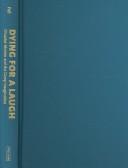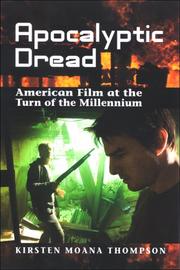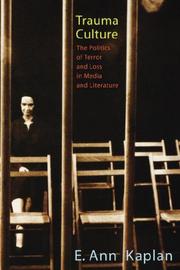| Listing 1 - 7 of 7 |
Sort by
|
Book
ISBN: 1476634807 9781476634807 9781476667300 1476667306 Year: 2019 Publisher: Jefferson, North Carolina : McFarland & Company, Incorporated Publishers,
Abstract | Keywords | Export | Availability | Bookmark
 Loading...
Loading...Choose an application
- Reference Manager
- EndNote
- RefWorks (Direct export to RefWorks)
"From the 1950s through the 1970s, disaster films were among the most popular of any genre. This book is a guide to disaster films of this golden age. Featuring interviews as well as vintage photos, lobby cards, and production stills, The Golden Age of Disaster Films a fascinating look into the genre of disaster cinema"--

ISBN: 0819567922 Year: 2005 Publisher: Middletown, Conn. : Wesleyan University Press,
Abstract | Keywords | Export | Availability | Bookmark
 Loading...
Loading...Choose an application
- Reference Manager
- EndNote
- RefWorks (Direct export to RefWorks)
Disaster films --- Homosexuality and motion pictures. --- History and criticism.
Book
ISBN: 9048550009 946372012X 9048561620 Year: 2020 Publisher: Amsterdam : Amsterdam University Press,
Abstract | Keywords | Export | Availability | Bookmark
 Loading...
Loading...Choose an application
- Reference Manager
- EndNote
- RefWorks (Direct export to RefWorks)
How do we experience disaster films in cinema? And where does disaster cinema come from? The two questions are more closely related than one might initially think. For the framework of the cinematic experience of natural disasters has its roots in the mid-eighteenth century when the aesthetic category of the sublime was re-established as the primary mode for appreciating nature's violent forces. In this book, the sublime is understood as a complex and culturally specific meeting point between philosophical thought, artistic creation, social and technical development, and popular imagination. On the one hand, the sublime provides a receptive model to uncover how cinematic disaster depictions affect our senses, bodies and minds. On the other hand, this experiential framework of disaster cinema is only one of the most recent agents within the historical trajectory of sublime disasters, which is traced in this book among a broad range of media: from landscape and history painting to a variety of pictorial devices like Eidophusikon, Panorama, Diorama, and, finally, cinema.

ISBN: 079148033X 142947145X 9781429471459 9780791470435 0791470431 9780791470442 079147044X 9780791480335 Year: 2007 Publisher: Albany : State University of New York Press,
Abstract | Keywords | Export | Availability | Bookmark
 Loading...
Loading...Choose an application
- Reference Manager
- EndNote
- RefWorks (Direct export to RefWorks)
In Apocalyptic Dread, Kirsten Moana Thompson examines how fears and anxieties about the future are reflected in recent American cinema. Through close readings of such films as Cape Fear, Candyman, Dolores Claiborne, Se7en, Signs, and War of the Worlds, Thompson argues that a longstanding American apocalyptic tradition permeates our popular culture, spreading from science-fiction and disaster films into horror, crime, and melodrama. Drawing upon Kierkegaard's notion of dread—that is, a fundamental anxiety and ambivalence about existential choice and the future—Thompson suggests that the apocalyptic dread revealed in these films, and its guiding tropes of violence, retribution, and renewal, also reveal deep-seated anxieties about historical fragmentation and change, anxieties that are in turn displaced onto each film's particular "monster," whether human, demonic, or eschatological.
Apocalypse in motion pictures. --- Science fiction films --- Disaster films --- Horror films --- Catastrophe films --- Disaster movies --- Motion pictures --- Apocalypse as a theme in motion pictures --- History and criticism.
Book
ISBN: 1443846481 9781443846486 1443842419 9781443842419 Year: 2013 Publisher: Newcastle upon Tyne : Cambridge Scholars Pub.,
Abstract | Keywords | Export | Availability | Bookmark
 Loading...
Loading...Choose an application
- Reference Manager
- EndNote
- RefWorks (Direct export to RefWorks)
The imagining of disaster has intensified across a wide range of media entertainment formats and genres in recent years and themes of disaster are regularly deployed in fictional films, television drama series, drama-documentaries, comic books and video games. This being the case, it is therefore vital that film and media scholars pay attention to the ways in which disaster is presented to us, to the figurative strategies employed, to the representational history of disaster in media, to the ...
Disaster films --- Disasters --- Calamities --- Catastrophes --- Curiosities and wonders --- Accidents --- Hazardous geographic environments --- Catastrophe films --- Disaster movies --- Motion pictures --- History and criticism --- Press coverage

ISBN: 1282134442 9786613807021 0813541166 9780813541167 0813535905 9780813535906 0813535913 9780813535913 9781282134447 6613807028 Year: 2005 Publisher: New Brunswick, N.J. : Rutgers University Press,
Abstract | Keywords | Export | Availability | Bookmark
 Loading...
Loading...Choose an application
- Reference Manager
- EndNote
- RefWorks (Direct export to RefWorks)
It may be said that every trauma is two traumas or ten thousand-depending on the number of people involved. How one experiences and reacts to an event is unique and depends largely on one's direct or indirect positioning, personal psychic history, and individual memories. But equally important to the experience of trauma are the broader political and cultural contexts within which a catastrophe takes place and how it is "managed" by institutional forces, including the media. In Trauma Culture, E. Ann Kaplan explores the relationship between the impact of trauma on individuals and on entire cultures and nations. Arguing that humans possess a compelling need to draw meaning from personal experience and to communicate what happens to others, she examines the artistic, literary, and cinematic forms that are often used to bridge the individual and collective experience. A number of case studies, including Sigmund Freud's Moses and Monotheism, Marguerite Duras' La Douleur, Sarah Kofman's Rue Ordener, Rue Labat, Alfred Hitchcock's Spellbound, and Tracey Moffatt's Night Cries, reveal how empathy can be fostered without the sensationalistic element that typifies the media. From World War II to 9/11, this passionate study eloquently navigates the contentious debates surrounding trauma theory and persuasively advocates the responsible sharing and translating of catastrophe.
Culture in motion pictures. --- Disaster films - History and criticism. --- Disaster films -- History and criticism. --- Literature, Modern - 20th century - History and criticism. --- Literature, Modern -- 20th century -- History and criticism. --- Psychic trauma in literature. --- Psychic trauma in motion pictures. --- Terrorism in motion pictures. --- Terrorism in motion pictures --- Disaster films --- Psychic trauma in motion pictures --- Psychic trauma in literature --- Literature, Modern --- Culture in motion pictures --- Film --- Music, Dance, Drama & Film --- Motion pictures --- Modern literature --- Arts, Modern --- Disasters in motion pictures --- History and criticism --- History and criticism. --- 791.41 --- 9/11 --- Deren Maya --- Duras Marguerite --- film --- film en psychoanalyse --- Freud Sigmund --- Hitchcock Alfred --- Irak --- Kofman Sarah --- Moffatt Tracey --- oorlogen --- postkolonialisme --- psychoanalyse --- psychologie --- Rwanda --- Spellbound --- terrorisme --- trauma's --- Social psychology --- Sociology of culture --- Mass communications --- Literature --- Disaster films - History and criticism --- Literature, Modern - 20th century - History and criticism
Book
ISBN: 0231188625 0231547951 9780231547956 9780231188623 9780231188623 9780231188630 0231188633 Year: 2018 Publisher: New York, NY : Columbia University Press,
Abstract | Keywords | Export | Availability | Bookmark
 Loading...
Loading...Choose an application
- Reference Manager
- EndNote
- RefWorks (Direct export to RefWorks)
Why do we have the constant feeling that disaster is looming? Beyond the images of atomic apocalypse that have haunted us for decades, we are dazzled now by an array of possible catastrophe scenarios: climate change, financial crises, environmental disasters, technological meltdowns-perennial subjects of literature, film, popular culture, and political debate. Is this preoccupation with catastrophe questionable alarmism or complacent passivity? Or are there certain truths that can be revealed only in apocalypse?In The Future as Catastrophe, Eva Horn offers a novel critique of the modern fascination with disaster, which she treats as a symptom of our relationship to the future. Analyzing the catastrophic imaginary from its cultural and historical roots in Romanticism and the figure of the Last Man, through the narratives of climatic cataclysm and the Cold War's apocalyptic sublime, to the contemporary popularity of disaster fiction and end-of-the-world blockbusters, Horn argues that apocalypse always haunts the modern idea of a future that can be anticipated and planned. Considering works by Lord Byron, J. G. Ballard, and Cormac McCarthy and films such as 12 Monkeys and Minority Report alongside scientific scenarios and political metaphors, she analyzes catastrophic thought experiments and the question of survival, the choices legitimized by imagined states of exception, and the contradictions inherent in preventative measures taken in the name of technical safety or political security. What makes today's obsession different from previous epochs' is the sense of a "catastrophe without event," a stealthily creeping process of disintegration. Ultimately, Horn argues, imagined catastrophes offer us intellectual tools that can render a future shadowed with apocalyptic possibilities affectively, epistemologically, and politically accessible.
Fiction --- Disasters in literature. --- Future, The, in literature. --- Future in literature --- History and criticism. --- Disasters in literature --- Future, The, in literature --- Disaster films --- Future, The, in motion pictures --- Future in motion pictures --- Motion pictures --- Disasters in motion pictures --- History and criticism
| Listing 1 - 7 of 7 |
Sort by
|

 Search
Search Feedback
Feedback About UniCat
About UniCat  Help
Help News
News